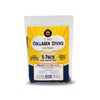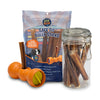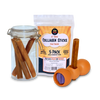As dogs age, their nutritional needs start to change. Just like humans, senior dogs often need adjustments in their diet to stay healthy, active and comfortable. You may be wondering if senior dog food is really necessary, how it differs from regular food or whether it’s time to make the switch. This guide will answer common questions and help you choose the best senior dog food for your four-legged friend.
What Is the Difference Between Senior Dog Food and Regular Dog Food?
The main difference between senior dog food and regular adult formulas lies in the nutrition profile. While both adult and senior formulas are complete and balanced, they have different priorities.
- Adult Dog Food: Focuses on maintaining energy, muscle and overall health. Typically higher in calories.
- Senior Dog Food: Focuses on managing weight, supporting joints and promoting easier digestion. Usually lower in calories and fat, with added supplements.

About Senior Dog Food
Nutrient Content
- Reduced calories: Senior dogs often have lower activity levels, which means they burn fewer calories. Senior formulas help prevent unwanted weight gain by lowering calorie density.
- Balanced protein levels: Many senior foods provide protein that’s easier to digest and absorb. This supports muscle maintenance without overloading aging kidneys.
- Increased fiber: Extra fiber can improve digestion and help with constipation, a common issue in older dogs.
- Joint support supplements: Ingredients like glucosamine and chondroitin are frequently added to help reduce inflammation and promote joint health.
- Omega-3 fatty acids: Found in fish oils and other sources, omega-3s support heart health, help reduce inflammation and may even aid in cognitive function for aging dogs.
Digestibility
- Senior foods are often easier to chew and digest, with smaller kibble sizes or softer textures.
- Many formulas also include prebiotics and probiotics to promote gut health and improve nutrient absorption.
Specific Health Concerns
- Some senior foods are tailored to address age-related issues such as kidney disease, weight management or cognitive decline.
- Prescription-style senior diets may be recommended by vets for dogs with chronic conditions.
Other Considerations
- Senior dog foods often cost more than adult formulas due to the specialized ingredients and supplements.
- Not every senior dog has the same needs, so it’s important to consult your veterinarian to find the formula that best supports your individual dog’s health.
When to Switch to Senior Dog Food
Breed and size play a big role in how dogs age, so there’s no one-size-fits-all age to switch.
- Small breeds may not need senior food until age 9 or 10.
- Large breeds often benefit from senior formulas as early as age 6 or 7.
Is Senior Dog Food Necessary?
Not every dog automatically needs senior food once they reach a certain age. Some healthy, active dogs may thrive on adult formulas for longer. Senior food becomes more important when:
- Your dog is gaining or losing weight unexpectedly.
- Joint issues or arthritis are becoming noticeable.
- Your vet recommends a specialized formula for heart, kidney or digestive health.

How to Choose the Best Senior Dog Food
When browsing senior dog food options, keep these tips in mind:
- Check for AAFCO approval to ensure the food meets nutritional standards.
- Look at the first ingredients to see if real meat or high-quality proteins come first.
- Avoid fillers and by-products that add bulk but little nutrition.
- Watch for added benefits like joint, heart and digestive support.
Most importantly, choose food based on your dog’s individual needs. Your veterinarian can recommend the best formula based on health, size and breed.
Consider the Senior Version of Their Current Food
If your dog is doing well on their current adult food, an easy option is to stick with the same brand and simply move to the senior version. This way, the flavor and base formula remain familiar, making the transition easier.
When switching foods, do it gradually:
- Mix a small amount of the new food with the old.
- Slowly increase the proportion over 7–10 days.
- Watch for digestive changes and adjust if needed.
This gentle transition helps prevent upset stomachs and makes it more likely your dog will accept the new food happily.
The Bottom Line on Senior vs. Regular Dog Food
Senior dog food isn’t just about age—it’s about meeting your dog’s changing needs as they get older. Whether you switch now or in the future, knowing the differences between adult and senior formulas will help you make the right choice. By monitoring your dog’s health, consulting your vet and choosing a high-quality senior dog food, you can help your best friend enjoy their golden years with energy and comfort.

















